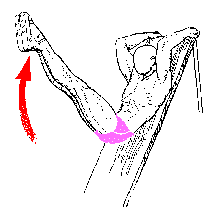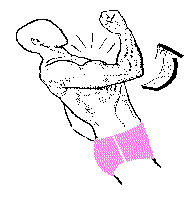
|

|
|
Sam Fussell has written a book called 'Muscle - Confessions of an Unlikely Bodybuilder”. Initially it seemed to me the worst kind of tabloid tripe; any autobiography with the word 'confessions” in the title has got to be worth a miss. Worse still were the black and white
pictures in the centre pages, which were your basic before and after photographs, showing the author as a skinny six foot twenty-four year old and eventually an enormous, repulsive, thirty year old. But much as I hate to be a voyeur, it was the pictures that got me.
As a woman I was fascinated. It wasn`t the stereotyped sexual attraction to a 'big”man; in fact most women I know find men of that size a distinct turn-off. But what I was amazed at was why a person would wish to become huge like that. Tempted by the pictures into reading the book, it began to make sense. The author was an Oxford graduate living in New York and finding it difficult. He tells of incidents of abuse in the street, ranging from name-calling and piss-taking to the threat of violence. Worried to distraction by this modern pressure, he almost by accident becomes involved in body building and sets out to become as big as possible.
I was stunned by how much hard work it was to become that big, how eating that much, taking in those many calories could be so punishing. But initially the reader has a feeling of approval, when you consider the alternatives to dealing with the pressures of modern life. If
society punishes men for being small, why shouldn`t they become incredibly big as a way of collaborating but also undermining? The beginning of the book feels quite positive, there is a solution and the author is exploring it. What makes this book so valuable, however, is the
fact that the author sees through this solution to its natural conclusion: How big is too big? and Are the sacrifices made to size worth it?
Questions like these struck a cord with me, perhaps in a slightly different way than they would with a male reader. My main fascination with this book had not been that the author uses his body as an instrument for dealing with the abuse society throws at him. This is a method that many, if not all women, are using consciously or sub-consciously day after day. The subtle difference, which may seem too blindingly obvious to be worth mention, is that while men such as Sam Fussell wish to become bigger to cope with society`s pressures, most women wish to become smaller.
I say women and some men use their bodies like tools of survival to cope with what life throws at them. Life does throw a lot at us, both genders. In 'Muscle”, Fussell`s pre-bodybuilding character lists his worries as 'rapes, muggings, the assaults, the murders... the teeming populace, dwarfed by skyscrapers, suffocated by the fumes of factories and expressways.” These are perhaps dangers more often encountered by city-dwellers, but as Naomi Wolfe points out in her impressive (but occasionally paranoid) polemic 'The Beauty Myth”, there are other hazards faced by all women everywhere, for example 'at least one woman in six has been raped” and ” one and one half million American women are assaulted by a partner every year”. Add to this the modern warnings over the nation`s deteriorating health, heart disease, cancers, AIDS and the impending lack of government provision for the NHS and pensioners and there is a very worrying picture sketched out for men and women`s
bodies in the next few decades.
If it is agreed that keeping the body fit and healthy by exercising can be and is often used as a tool for survival in a world that seems to be assaulting us, the question that is begging to be asked is, why is there such a vast difference between what men and women do with their bodies to survive? Why do men stereotypically wish to take up more space while women stereotypically wish to take up less?
In 'Muscle”, Sam Fussell says that initially he saw size and muscle as a kind of 'modern day armor” which would act as a preventative measure. He believed that gaining size would mean that deep down he would not have to become as aggressive as his aggressors, he would
merely look that way. He then set out on a starter program of four hours a day in the gym, perfecting a size that would act as a warning to others, not simply as a defence.
Since the early Eighties, fitness gyms have become an increasingly popular option among women who want to keep their bodies fit and healthy. But unlike men such as Sam Fussell, women have traditionally used the gym and weight training as a way to pare down their bodies, rather than build them up. While men are encouraged to lift heavier and heavier
weights in order to build musculature, women are advised to lift very light weights for a greater number of repetitions. Both techniques help to increase strength, ( though obviously the latter to a lesser degree) but only heavy weight lifting enables the body to look strong.
Only heavy weight lifting provides the body with that form of danger prevention and protection coveted by the hero of 'Muscle”. Why are women encouraged to be strong but not look strong?
In 'The Beauty Myth” again, Naomi Wolfe maintains that modern women are exhausting themselves, not only with fitness obsessiveness but also with food phobias ranging in severity from calorie counting to anorexia, all in the effort to become small. Wolfe`s answer to the
question why should women wish their bodies to look as small and fleshless as children`s is that they are attempting to escape the dangers that modern life presents to adult women; such as rape, murder, unwanted attention from the opposite sex plus all the fears discussed by Sam
Fussell. Her answer to the question why should men wish to become big and women wish to become small is simply that we have all been conditioned in this way, in order to maintain a social order that provided the basis of many successful industries.
So in this light is there anything to be gained from weight training? Have hundreds of thousands of men and women been spending time, money and energy simply in a fruitless quest to conform to and ideal body image manipulated by the media? I don`t think so. Perhaps most who begin weight training are driven by that guilt that unfortunately many of us feel ab out our lack of control over our body shape. But I`m sure that almost all of those who begin weights eventually gain more from it than that.
Firstly there are many genuine physical benefits to be had from sensible work with weights, ranging from stabilising your metabolism to strengthening joints and bone mass which helps prevent osteoporosis, one of the most common debilitating diseases in older women. But what is of more importance to many is that there are other benefits to be gleaned from weight training, which perhaps account for the large numbers of men and women who do become almost fanatical, dare I say obsessed, about their progress.
What weights offers to many, what it offered to Sam Fussell, is a form of control. Like many sports, it offers a way to release energies, tensions, to forget problems and to focus your mind on one specific problem, almost in the way that Eastern religions emphasise empty minds during meditation. We are often told of the busy lives we lead, (and if we aren`t leading those lives we`re often made to feel guilty for it) and weight training does offer a way of focusing on yourself, of treating yourself, or of monitoring yourself and the toll your life is taking on you physically.
Feminists have long said that women do need a way of taking control of their lives, to avoid simply falling into traditional roles, and initially, in the early Eighties, images of women working out and looking fit were welcomed as some signifier of empowerment. Later though, it was all to go wrong. Women were not encouraged to work out to gain control, or to devote time to themselves in some way, or to maintain a healthy body even. They were encouraged to work out to stay small. Cases of anorexia and bulimia rose with gym subscriptions and many women grew suspicious of the exercise culture, afraid to try and compete with what Naomi Wolfe called the 'iron maiden”, the ideal body image which actually weighed on average 23% below healthy average weight.
So what are we to do? Exercise is one way of reclaiming control over our bodies for both men and women, but how can we rid ourselves of the traditional roles that have caused so much grief for all of us, dictating men become unfeasibly big and women become unfeasibly small?
Obviously there are no easy answers. An entire culture is not easily changed, though it can gradually catch up with the individuals it should be catering for. Perhaps promoting greater awareness of the body image issue is a good place to start, so that people can make an informed choice, free from guilt, about what they wish their bodies to look like, much in the same way that drugs legalisation groups campaign for informed choice about what we put into our bodies. It`s time that exercise was seen once again as a positive activity for men and women to fit into their lives, but we need first the freedom to choose exactly why we are exercising, and who we are trying to please in doing so.
Carrie McMillan. 1995 |
|
